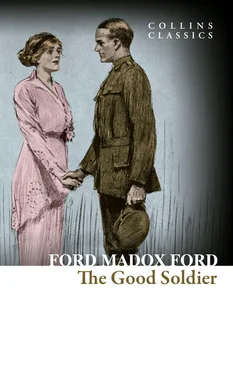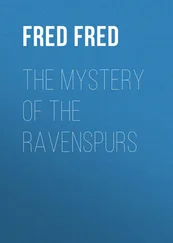And that was an extraordinary thing to say. Quite extraordinary. I couldn’t for the life of me refer to total strangers as nice people. But, of course, she was taking a line of her own in which I at any rate—and no one else in the room, for she too had taken the trouble to read through the list of guests—counted any more than so many clean, bull terriers. And she sat down rather brilliantly at a vacant table, beside ours—one that was reserved for the Guggenheimers. And she just sat absolutely deaf to the remonstrances of the head waiter with his face like a grey ram’s. That poor chap was doing his steadfast duty too. He knew that the Guggenheimers of Chicago, after they had stayed there a month and had worried the poor life out of him, would give him two dollars fifty and grumble at the tipping system. And he knew that Teddy Ashburnham and his wife would give him no trouble whatever except what the smiles of Leonora might cause in his apparently unimpressionable bosom—though you never can tell what may go on behind even a not quite spotless plastron!—And every week Edward Ashburnham would give him a solid, sound, golden English sovereign. Yet this stout fellow was intent on saving that table for the Guggenheimers of Chicago. It ended in Florence saying:
“Why shouldn’t we all eat out of the same trough?—that’s a nasty New York saying. But I’m sure we’re all nice quiet people and there can be four seats at our table. It’s round.”
Then came, as it were, an appreciative gurgle from the Captain and I was perfectly aware of a slight hesitation—a quick sharp motion in Mrs Ashburnham, as if her horse had checked. But she put it at the fence all right, rising from the seat she had taken and sitting down opposite me, as it were, all in one motion. I never thought that Leonora looked her best in evening dress. She seemed to get it too clearly cut, there was no ruffling. She always affected black and her shoulders were too classical. She seemed to stand out of her corsage as a white marble bust might out of a black Wedgwood vase. I don’t know.
I loved Leonora always and, today, I would very cheerfully lay down my life, what is left of it, in her service. But I am sure I never had the beginnings of a trace of what is called the sex instinct towards her. And I suppose—no I am certain that she never had it towards me. As far as I am concerned I think it was those white shoulders that did it. I seemed to feel when I looked at them that, if ever I should press my lips upon them that they would be slightly cold—not icily, not without a touch of human heat, but, as they say of baths, with the chill off. I seemed to feel chilled at the end of my lips when I looked at her …
No, Leonora always appeared to me at her best in a blue tailor-made. Then her glorious hair wasn’t deadened by her white shoulders. Certain women’s lines guide your eyes to their necks, their eyelashes, their lips, their breasts. But Leonora’s seemed to conduct your gaze always to her wrist. And the wrist was at its best in a black or a dog-skin glove and there was always a gold circlet with a little chain supporting a very small golden key to a dispatch box. Perhaps it was that in which she locked up her heart and her feelings.
Anyhow, she sat down opposite me and then, for the first time, she paid any attention to my existence. She gave me, suddenly, yet deliberately, one long stare. Her eyes too were blue and dark and the eyelids were so arched that they gave you the whole round of the irises. And it was a most remarkable, a most moving glance, as if for a moment a lighthouse had looked at me. I seemed to perceive the swift questions chasing each other through the brain that was behind them. I seemed to hear the brain ask and the eyes answer with all the simpleness of a woman who was a good hand at taking in qualities of a horse—as indeed she was. “Stands well; has plenty of room for his oats behind the girth. Not so much in the way of shoulders,” and so on. And so her eyes asked: “Is this man trustworthy in money matters; is he likely to try to play the lover; is he likely to let his women be troublesome? Is he, above all, likely to babble about my affairs?”
And, suddenly, into those cold, slightly defiant, almost defensive china blue orbs, there came a warmth, a tenderness, a friendly recognition … oh, it was very charming and very touching—and quite mortifying. It was the look of a mother to her son, of a sister to her brother. It implied trust; it implied the want of any necessity for barriers. By God, she looked at me as if I were an invalid—as any kind woman may look at a poor chap in a bath chair. And, yes, from that day forward she always treated me and not Florence as if I were the invalid. Why, she would run after me with a rug upon chilly days. I suppose, therefore, that her eyes had made a favourable answer. Or, perhaps, it wasn’t a favourable answer. And then Florence said: “And so the whole round table is begun.” Again Edward Ashburnham gurgled slightly in his throat; but Leonora shivered a little, as if a goose had walked over her grave. And I was passing her the nickel-silver basket of rolls. Avanti! …
4 Chapter 4 Chapter 5 Chapter 6 Part Two Chapter 1 Chapter 2 Part Three Chapter 1 Chapter 2 Chapter 3 Chapter 4 Chapter 5 Part Four Chapter 1 Chapter 2 Chapter 3 Chapter 4 Chapter 5 Chapter 6 Classic Literature: Words and Phrases About the Publisher
So began those nine years of uninterrupted tranquillity. They were characterized by an extraordinary want of any communicativeness on the part of the Ashburnhams to which we, on our part, replied by leaving out quite as extraordinarily, and nearly as completely, the personal note. Indeed, you may take it that what characterized our relationship was an atmosphere of taking everything for granted. The given proposition was, that we were all “good people.” We took for granted that we all liked beef underdone but not too underdone; that both men preferred a good liqueur brandy after lunch; that both women drank a very light Rhine wine qualified with Fachingen water—that sort of thing. It was also taken for granted that we were both sufficiently well off to afford anything that we could reasonably want in the way of amusements fitting to our station—that we could take motor cars and carriages by the day; that we could give each other dinners and dine our friends and we could indulge if we liked in economy. Thus, Florence was in the habit of having the Daily Telegraph sent to her every day from London. She was always an Anglo-maniac, was Florence; the Paris edition of the New York Herald was always good enough for me. But when we discovered that the Ashburnhams’ copy of the London paper followed them from England, Leonora and Florence decided between them to suppress one subscription one year and the other the next. Similarly it was the habit of the Grand Duke of Nassau Schwerin, who came yearly to the baths, to dine once with about eighteen families of regular Kur guests. In return he would give a dinner of all the eighteen at once. And, since these dinners were rather expensive (you had to take the Grand Duke and a good many of his suite and any members of the diplomatic bodies that might be there)—Florence and Leonora, putting their heads together, didn’t see why we shouldn’t give the Grand Duke his dinner together. And so we did. I don’t suppose the Serenity minded that economy, or even noticed it. At any rate, our joint dinner to the Royal Personage gradually assumed the aspect of a yearly function. Indeed, it grew larger and larger, until it became a sort of closing function for the season, at any rate as far as we were concerned. I don’t in the least mean to say that we were the sort of persons who aspired to mix “with royalty.” We didn’t; we hadn’t any claims; we were just “good people.” But the Grand Duke was a pleasant, affable sort of royalty, like the late King Edward VII, and it was pleasant to hear him talk about the races and, very occasionally, as a bonne bouche, about his nephew, the Emperor; or to have him pause for a moment in his walk to ask after the progress of our cures or to be benignantly interested in the amount of money we had put on Lelöffel’s hunter for the Frankfurt Welter Stakes.
Читать дальше












